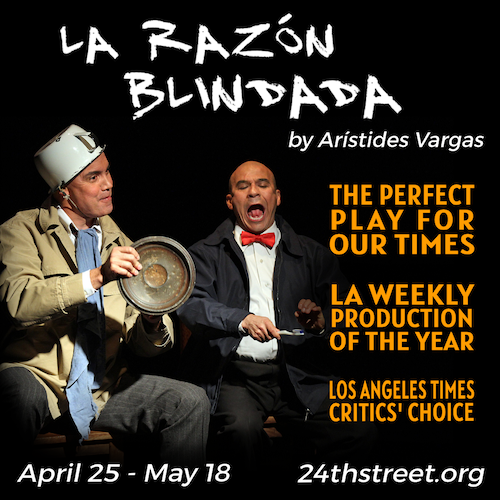Mexican Day
Reviewed by Iris Mann
Rogue Machine Theatre
Through July 1
Playwright Tom Jacobson has written a trilogy documenting the social unrest in Los Angeles during the early to mid-20th century, with the three plays produced almost simultaneously at three different venues. Mexican Day, a Rogue Theatre presentation, is the last in the trilogy. The play is based on historical fact, and most of the characters were real people. The story focuses on the attempt by African-American civil rights activist Bayard Rustin, who was gay at a time when that orientation was socially unacceptable, to desegregate Bimini Baths, a famous spa located just west of downtown L.A., near Vermont Avenue.
The baths were open to whites only, except on one Thursday of the month, known as Mexican Day (hence the title), just before the pools were drained and filled with clean water. That was the day on which all races were welcome.
This is a tale that cries out to be told, so I approached the opening with great expectations. How disappointing, then, to have encountered a lackluster, overwritten drama that should inflame but fails to ignite.
The action takes place in 1948, with Rustin (Donathan Walters) dispensed to the City of Angels by the Fellowship of Reconciliation. Needing allies for his cause, Rustin enlists the help of Hisaye Yamamoto (Jully Lee), a Japanese-American woman whose family had been held in an internment camp during the Second World War. She writes a column for an African-American newspaper known as the Los Angeles Tribune. In joining Rustin’s effort, she defies her editor, who insists that the paper’s journalists report on the facts of a story, but never get involved by taking sides or becoming activists.
When Yamamoto and Rustin attempt to gain access to the baths, they are barred at the entrance by a Mexican-American employee, Zenobio Remedios ((Jonathan Medina). A World War II vet, he is still haunted by memories of helping to liberate the Dachau concentration camp. Though the spa discriminates against his own people, Remedios must maintain the policy in order to keep his job.
Into the mix comes art critic and screenwriter Everett Maxwell (Darrell Larson), a white man on the side of the oppressed, whom Rustin feels would be an asset to his campaign. But Maxwell has a dark secret that renders him reluctant to participate. Lesser characters, all played by the four principles, come and go.
What ensues is a series of confrontations, revelations and a limited victory. While the work is informative, Jacobson has packed it with so many themes — racism, sexism, homophobia, pedophilia, personal angst, the conflict between principle and job security as well as the conflict between upholding journalistic objectivity and taking a stand based on morality — that its main message is diluted. In this case, less would be more.
In addition, having the characters go into the audience to engage directly with audience members only serves to complicate the piece and halt its momentum. And, even though Jacobson refers to the story as “The Ballad of Bimini Baths,” the inclusion of characters who play the mandolin or sing ultimately trivializes the core of the narrative.
Nor does director Jeff Liu’s staging alleviate the play’s inherent problems. He has paced the piece so that all the issues are given equal weight, with no dramatic demarcation between them, so we have no chance to digest each theme. As for the performances, Liu has failed to extract the fully committed passion from his cast demanded by the weighty subject matter. A great deal of the work seems to be superficial.
Archival footage of Bayard Rustin reveals him to have been a fiery, powerful presence, but Walters displays a softer demeanor that exhibits none of the commanding quality that defined the public Rustin. The actor comes across as more of an ardent follower than an overpowering leader. And although Lee is appealing, she lacks the fire in the belly that one would expect, given her character’s hunger for justice in the wake of the experiences she endured. Lee also tends to rush some of her speeches, particularly in the beginning, so that parts of her dialogue are unintelligible.
As for Medina, he frequently displays a stoic quality that keeps him from projecting any sense of Remedios’s painful inner conflict over having to enforce a policy that victimizes Latinos. Finally, Larson, portraying a man who refrains from participating in the protest until the very end, holds too much back in his performance; he should be more invested in his character’s shame and neediness.
Ultimately, the campaign to integrate Bimini Baths was successful but short-lived. The spa went bankrupt and closed its doors in 1951.
Somewhere in here there is a play, but it has not been realized.
Met Theatre, 1089 N. Oxford Ave., Los Angeles; Fri-Sun., 8:00 p.m.; Sat., 4 p.m.; through July 1. (855)585-5185(855)585-5185(












